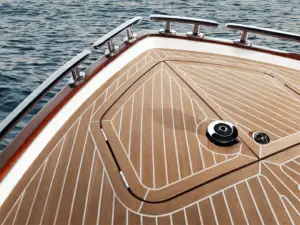
Every experienced boat owner understands that safety is a priority when searching for boat flooring ideas. The right boat floor will make the difference for the boat and its owner. This is because boat walkways become slippery when wet, resulting in falls and injuries. However, the best boat floors have many color and design options, as well as varying thickness and dimensions.
Boat floors are available in different materials giving the buyer a variety of options that suits their preferences and financial capabilities. The key to the perfect boat floor is to use long-lasting materials which reduce rust while also providing a non-slippery surface. Boat flooring materials come in vinyl, wood, tiles, and more. This article will help readers make the right choice when searching for boat flooring ideas.
?? Why Is It Important To Choose The Right Flooring For Your Boat?
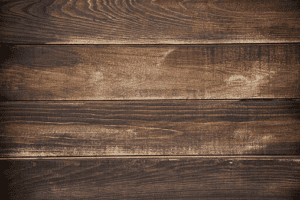
A good boat owner understands the importance of choosing the best flooring for their boat. Boat decks constantly have water, slime, and other substances that erode and break down the deck’s structural integrity. So, boat owners should always go for boat flooring that provides comfort, superior traction, and easy clean-up. Below are some of the reasons why one must choose the right flooring for their boats.
Deck Protection
If the boat deck is in constant contact with seawater, the odds of the deck falling apart is high. Boat floors made of iron will rust fast if salt content from seawater comes in contact with the deck. It is vital to choose a suitable boat flooring to solve the issues mentioned above.
Comfort
Luxury boat owners will benefit from choosing a nice and plush boat floor. Carpet flooring will be the best bet for those who seek comfort in their boat floors.
Style
A good boat floor will add style and class to the boat’s interior. Carpets and woods are some boat floor ideas that can make the interior look beautifully styled.
?? Boat Flooring Ideas
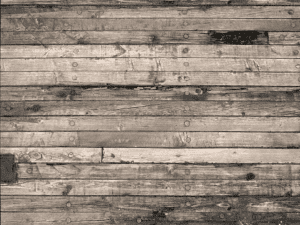
Choosing the best flooring material for a boat goes a long way in determining the vessel’s longevity. The preferred material should fit the style and choices of the boat owner. Whether for business or pleasure, the wrong boat flooring idea will cost the boat owner a lot in the long run.
Some of the best flooring manufacturers produce materials using wood, fiberglass, and more. The suitable material should protect the boat’s hull. It should also be able to withstand rigorous movements and outdoor activities. Below are some of the materials used in boat flooring ideas.
Wood
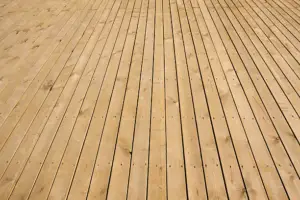
Wood is a popular flooring type because it lasts longer. When the wood is taken care of, it can last for a long time. New boat owners should go for wood flooring because of their low maintenance cost. Hardwood is an excellent option when using wood for boat flooring. It provides durability, flexibility, and water resistance. Unfortunately, hardwood also has some disadvantages, including being prone to disintegration over a while.
Carpets

Boat Carpets are made of nylon, polyester, and wool material. Carpet flooring is a cheap option for those on a tight budget. Boat enthusiasts prefer carpets because they can use any home carpet for the boat floor. These carpets are easy to clean and long-lasting. However, for those who want better quality carpets, they will need to spend more money.
Linoleum
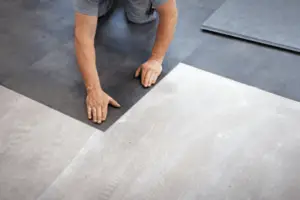
Vinyl planks can withstand wet conditions, and they are very durable. They are also water-resistant and work pretty well as a deck floor. If at any time the boat owner wants to do a revamp, Vinyl planks are cost-efficient and reusable. Vinyl planks are also easy to clean and maintain.
Specialty Paints
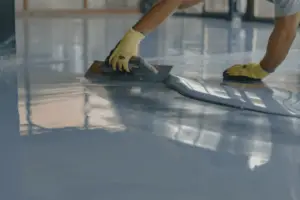
Specialty paints are specialized water-resistant marine paints that get frequently used on boat floors. Painting a boat is relatively easy and can be done without the help of a professional. Specialty paints are usually low on volatile organic compounds(VOC). The good thing about them is that they are not toxic. So, occupants of the boat can enter the vessel immediately after painting.
Canvas

Canvas is water-resistant and durable. Canvas material is amongst the oldest flooring options in the boat market. Canvas can withstand extreme weather conditions, making it great, especially for fishing vessels. The color options for canvas materials are limitless, giving the boat an aesthetic and pleasing finish. When their prices get compared to other floorings, canvas material comes out as the better option.
However, there are two disadvantages to using canvas materials for boat flooring. First, even though they are water-resistant, the canvas isn’t water-tight. Secondly, when a canvas becomes exposed to harsh weather conditions, the fabric will expand and degrade.
Adhesive Rubber Boat Flooring
Rubber flooring is environmentally friendly because they get made out of old car tires. They are attached to the boat flooring using an adhesive. Rubber marine flooring is easy to install and is slip-resistant. The downside to rubber flooring is that they are not UV-resistant. If the boat is docked in an area without shades, the protection will degrade. Rubber flooring will become very hot when exposed to the sun, making it uncomfortable to walk on.
PVC Tiles
PVC Tiles are easy to install. They provide a quick and efficient way to cover the boat’s deck. PVC tiles are water-proof and come in different designs and styles. They are also easily replaceable. The drawback to PVC tiles is that they are not UV-resistant and will degrade over time when exposed to sunlight.
Drainage Tiles
Drainage tiles are trendy amongst fishermen. Liquids penetrate drainage tiles and become contained by the drainage. The tile is cleaned by spraying using a water hose. Drainage tiles are easy to install and will fit easily into the shape of the boat deck.
?? Top 10 Vinyl Flooring Options
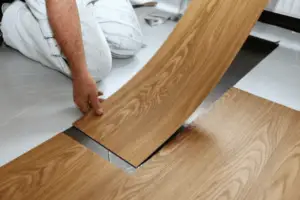
Vinyl is the oldest and most durable flooring option in the boat market. Vinyl floors are easy to use and able to withstand bad weather conditions. Vinyl floors are the best option for any boat owner that wants a durable yet stylish boat floor. Below are the top 10 vinyl flooring options.
Nautolex Marine Vinyl Floor
Nautolex Marine Vinyl Floor provides long-lasting performance even when exposed to harsh weather conditions. It comes in a textured design that provides skid resistance. Nautolex Marine Vinyl Floor is constructed using PVC and a cotton backing. The construction with the materials mentioned above makes it easy to clean with soap and water.
PROS
- It is easy to clean.
- It adds a beautiful design to the boat’s floor.
CONS
- It comes out dirty on the backside when cut.
MariDeck Marine Vinyl Floor
MariDeckMarine Vinyl Floor is attractive, durable, and easy to install. It is the perfect option for those who wish to replace their boat carpet. MariDeck is embossed using a slip-resistant surface. Boat owners can install the Marideck Vinyl on wood or fiberglass surfaces. If the user is installing it on a pontoon, they will have to buy the 102″. However, if the MariDeck is for a fishing boat, the 72″ width option will do fine.
PROS
- It has slip-resistant capabilities.
- It is applicable on a variety of surfaces.
CONS
- It takes a long time to deliver.
CNLZ EVA
Ethylene-Vinyl Acetate(EVA) is seismic, chemistry, and water-resistant. The good thing about EVA floors is that they can be customized to suit the boat. It has a length of 94.5″ and a width of 35.4″. They have high tensile strength, which makes them hard to tear. Although CNLZ EVA is built with durability in mind, they still come in stylish designs.
CNLZ is easy to maintain. The pressure hose will serve well in removing tough stains without damaging the vinyl. It also provides a non-slip boat floor in both moist and dry conditions.
PROS
- It has a closed-cell structure which makes it non-absorbent.
- It is easy to clean and maintain.
- It is resistant to chemical corrosion.
CONS
- It doesn’t stick easily to the boat floor.
Zeos Eva Foam
Zeos Eva Foam is a self-adhesive boat flooring option that requires a simple hand wash to stay clean. It has a length of 94.5″ and a width of 35.4″. Zeos Eva Foam is about 0.24″ thick and comes with solid glue at the back. It is easy to wash and will fit easily into any part of the boat.
Zeos Eva Foam has a high tensile elongation and will not deform easily. The installation cost is reduced when using the Zeos Eva Foam because it comes with a strong back adhesive. The strong bond makes it easy to stick it to the boat floor.
PROS
- It reduces installation costs for the boat owner.
- It comes with a strong back adhesive.
CONS
- It has some defective units.
Bry-Tech Marine Vinyl
Bry-Tech Marine Vinyl weighs about 33 ounces and comes in a dark grey color. Bry-Tech has an advantage over many boat floor covers because it can last outdoors. It is UV light-resistant. It has good design colors both for boat seats and accessories. Bry-Tech Marine Vinyl is used by sewing into the surface or through stapling.
PROS
- It lasts long under sunlight.
- It has a wide variety of color options.
CONS
- Poor customer service.
Cozyyel Eva Faux
Cozyyel, like most vinyl materials, is highly tensile and long-lasting. The surface of Cozyyel vinyl is smooth and colorful. It is also odorless and non-toxic. Users of the Cozyyel don’t have to worry about stain removal because the material is stain-resistant and can be pressure-washed. It has a strong adhesive glue on the back, making it easier for installation.
PROS
- It has multi-function ability. The Cozyyel will do well on various surfaces.
- It is stain-resistant.
CONS
- The color fades quickly.
Churershining Eva Foam
Churershining Eva Foam is a 94.5″ long stain-resistant vinyl material. It is 34.5″ wide and has a thickness of 0.24″. Churershining can easily be cut down and washed. It can fit into any section of the boat where flooring is required. The material is non-skid, which will protect boat users from accidents. The strong glue means that boat owners can install the Churershining without the help of a professional.
PROS
- It is easy to set up.
- It is comfortable and durable.
CONS
- The adhesive glue is not strong.
RecPro Extreme
RecPro Extreme is a superb alternative for replacing carpet boat floors. It is certified as marine grade and slip-resistant. RecPro Extreme is a good choice because it is easy to use and maintain without hassles. The UV resistance capabilities make it a good choice for those who dock their boats in exposed areas. The back of the material can easily be glued down to the boat surface using its adhesive glue.
PROS
- It offers excellent value for money.
- It is easy to install.
CONS
- The material doesn’t respond well to water pressure.
Castaway Customs SeaDeck
SeaDeck material is shock-absorbent and very durable. It is soft, reducing the pressure of standing on the boat deck for long periods. It can be cut to fit different parts of the boat. 3 M-rated adhesive makes it easy for application on the boat’s floor. The Castaway SeaDeck can be hosed down, or pressure washed to remove stains and footprints. If one is looking for soft yet durable vinyl boat flooring, the SeaDeck is a perfect choice.
PROS
- It is incredibly soft.
- It is stain-resistant.
CONS
- Some units have incorrect length dimensions.
Lubemida Camo Boat Flooring
Lubemida Camo comes with an easy-to-cut material. The material can be applied quickly to various parts of the boat, including the deck. It provides exceptional traction in both wet and dry conditions. One of the advantages of the Lubemida Camo floor is that it is maintenance-free. It is very comfortable standing, making it unparalleled compared to other floor options. It also has a strong adhesive that makes it glue easily to the boat floor.
PROS
- It has a wide application.
- It fits easily into different parts of the boat when cut to size.
CONS
- It starts to shrink over some time.
Conclusion
Boat owners who use the best boat flooring ideas will notice that their decks last longer than others. Resistance to ultraviolet light is one of the features to look out for on a boat floor, especially for those that use their vessels under the sun. A good boat floor will last long while adding a touch of class and style to the user’s boat.